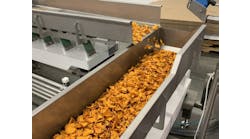Bob Lowder eyes the Iso-Flo conveyors at one of the Ocean Spray's Craisins lines.
Just this past May, Ocean Spray started up its fourth sweetened dried cranberry (SDC) production line, investing $15 million to process an additional 10-12 million lbs. of Craisins per year.
That kind of success brings with it a sticky problem: how to move these little treats in automated fashion. "The Craisins stick to any conventional belt conveyor, and just about everything else they come in contact with," says Bob Lowder, manager of capital engineering and MRO (maintenance, repair and operations) in the Lakeville, Mass., headquarters of the cranberry cooperative.
The cranberries start as frozen, hard marbles that are sliced, extracted, infused, dried and packaged, in a simplistic overview of the process. At each stage, they have dramatically different characteristics, which require unique handling solutions. Early in the process, the berries become wet, sticky and hard to handle. Near the end, they are hot, sticky and tacky.
"At our SDC plants, we operate 24/7. We're lightly crewed with highly automated systems," Lowder says. "Ocean Spray uses state-of-the-art equipment to ensure the highest product quality and product integrity. In terms of production efficiencies, we're spoiled. Our expectation for all our suppliers is that the equipment run unattended."
But those sticky, little dried cranberries seemed to defy automated material handling – at least an off-the-shelf solution. After rejecting some conventional products and having had good experiences in other plants with Key Technology Inc. (Ocean Spray gave Key a Supplier of the Year Award a few years ago), Ocean Spray officials partnered with Key to develop a unique solution for this challenging product and process.
Two production lines in Tomah, Wis., and two more in Middleboro, Mass., all depend on SmartShaker technology solutions from Key to handle a wide range of processes. Key's willingness to customize equipment and the expertise of its engineering staff were critical factors in the success of those lines.
"From the first piece of equipment on the processing line to the packaging equipment, Key handles our product," says Lowder. With dozens of Iso-Flo vibratory shakers on each of Ocean Spray's SDC lines, the versatile equipment is used to clean, wash, dewater, de-syrup, size, grade and convey at multiple points along the line.
"A lot of engineering - a lot of science - went into each Iso-Flo shaker here. Every one was customized for us. We've found the engineering and technical sales staff at Key to be willing and eager to accept any challenge. Design and development are their specialties," said Lowder.
All the Iso-Flo vibratory shakers use proprietary Iso-Drive frame-mounted drives, and StrongArm, Key's proprietary spring arm assemblies, which distribute energy equally to all parts of the conveyor bed in a controlled natural-frequency operation. With low amplitude, high frequency movement, Iso-Flo shakers minimize product degradation and reduce maintenance.
"The maintenance-free aspect of the Iso-Flo shakers is a huge improvement over other technologies we've had," adds Lowder. "We handle routine preventative maintenance and we're all set."
Key designs the stainless steel Iso-Flo shakers to require minimal cleaning. The shakers have rounded edges, sealed isolation springs and a smooth 2B surface finish. "We've even got customized legs that are tapered to eliminate areas where product and liquids can get hung up. These shakers are super hygienic and easy to clean," says Lowder.
Since first introducing Craisins in 1993, the fruit treat has grown into a significant business for Ocean Spray. And more growth is expected. "Long-range plans show we need another 30 million lbs. of production capacity relatively quickly," says Lowder. A new manufacturing line in Markham, Wash., which will begin operating in the spring of 2007, will add 15 million lbs., and there are plans for a sixth line in 2009.
"For the new line going into Markham, we'll use Key shakers again," notes Lowder. "Their technology is clearly at the forefront, and we couldn't be happier with them. But, we are trying something new in Markham, too – we'll be installing Key's new laser sorter. After running two sorters side-by-side, we decided that Key's Raptor is the right system for us in this application."
The new Optyx sorter with Raptor laser going into the Markham facility combines Key's color cameras and sorting platform with laser technology. Color sorting maximizes the detection and removal of defects while laser sorting detects and removes foreign material. Combining the two should improve product quality and food safety.
For more information, call Key Technologies at 509-529-2161, or see www.key.net.

